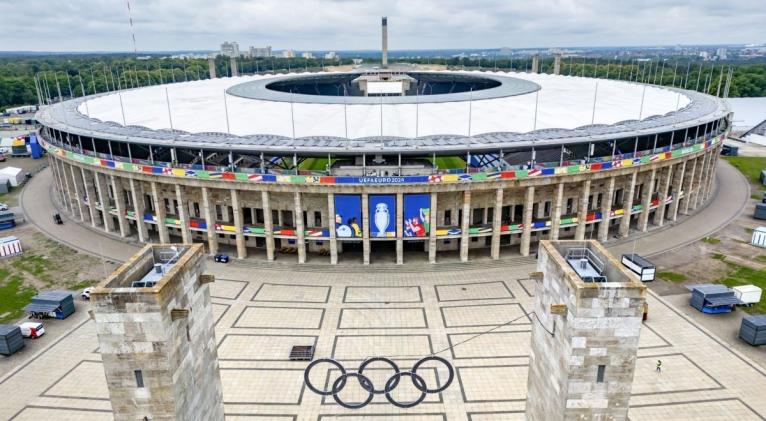Berlin unveils Olympic bid
especiales

With a proposal still in its embryonic stage, the German capital presented on Tuesday its bid to once again host an Olympic Games, and it did so in the historic Olympiastadion, the same venue where Jesse Owens was the star during the 1936 Games under Adolf Hitler's Nazi regime.
Berlin's Sports Minister, Iris Spranger, stated at a press conference that the city wants to organise a sustainable Games in 2036, 2040, or 2044, taking advantage of existing sports facilities. The project, named Berlin+, involves collaboration with four other German states: Brandenburg, Mecklenburg-Western Pomerania, Saxony, and Schleswig-Holstein.
According to the official roadmap, the next step is to present the proposal before Saturday to the German Olympic Sports Confederation (DOSB), which will decide on the bid to be submitted to the International Olympic Committee in the autumn of next year. With this move, Berlin+ positions itself ahead of its potential national rivals in the race to become Olympic host. The state of North Rhine-Westphalia is preparing an independent proposal, and Munich and Hamburg are also expected to present their own concepts soon.
The official presentation took place in the same stadium where, nearly a century ago, the Games were used as a propaganda tool by the Third Reich. In that context, Berlin's Mayor, Kai Wegner, highlighted the symbolic nature of the bid. "I believe that the Games of 2036, regardless of where they take place, will also focus on the Nazi Games of 1936. That is part of history and will be given attention," he told Associated Press. "I must tell you that I am proud to be the mayor of a city that has changed over the past 100 years; that no longer tolerates dictatorship, exclusion or mass violence, but instead, Berlin is now a cosmopolitan and international metropolis, a colourful and diverse city."
Following the model adopted by Paris 2024, the German capital is proposing a decentralised Games, with venues spread across several regions. Among the most notable proposals are beach volleyball matches next to the iconic Brandenburg Gate, skateboarding competitions at Tempelhof Airport (now converted into an urban park), and sailing events in the Baltic Sea, in cities such as Kiel or Rostock. Aquatic sports are also being considered in Grünau, a riverside town that also served as a venue in 1936.
Berlin's Olympiastadion, originally built for the 1936 Games, remains in active use today. Though its origins are tied to Nazi propaganda, with Adolf Hitler heavily involved in its planning and Leni Riefenstahl filming the Games for her controversial documentary Olympia, the stadium has long since been repurposed for modern sporting events. It now serves as the home ground for Hertha Berlin.
However, the path towards an official bid will not be without obstacles. Berlin has inherited the scepticism from previous failed Olympic proposals in Germany, such as Hamburg's for 2024 or Munich's for the 2022 Winter Games, both of which were rejected in referendums. A citizens' initiative called 'NOlympia Berlin' has already announced its intention to collect signatures to force a popular vote.
From the political arena, critical voices have also emerged. Klara Schedlich, a representative of the Green party, told AP that "Our tax money is better spent on sports clubs than on the IOC." For her part, Spranger opposed a referendum and advocated for "dialogue among ourselves. Not just yes or no, but that the public truly understands what we are planning," although she acknowledged that, for now, it remains an idea still at the concept stage.
Meanwhile, the President of the International Paralympic Committee, Andrew Parsons, welcomed the fact that there are multiple proposals. "The more quality bids we have, the better. We can compare different proposals… the different visions of various Games that will be held in different parts of the world," he told AP. Parsons, who also serves on the IOC's Future Host Commission, said that a strong bid from Berlin would be "very welcome."
The 2036 edition represents the next available date after Los Angeles 2028 and Brisbane 2032, and according to the usual criteria of continental rotation, Europe holds an advantage. For Berlin, hosting the Games exactly a century after those held under Nazism would be much more than a sporting event: it would be a message to the world about reconciliation, progress, and remembrance.
Under the DOSB's three-stage model, all applicants must submit their preliminary plans by end of May 2025. These will be reviewed for compliance and feasibility by September 2025, with viable projects showcased at the DOSB general assembly later that year. A final decision on the German bid is anticipated by fall 2026.
Germany last hosted the Summer Olympics in 1972 in Munich. Since then, several attempts to bring the Games back, including Berlin's 2000 bid, Leipzig's 2012 attempt, Munich's 2022 Winter Games proposal, and Hamburg's 2024 campaign, were unsuccessful, with some halted by public referendums.
With Los Angeles hosting in 2028 and Brisbane in 2032, other international contenders like India, Istanbul, Madrid, and Rome have expressed interest in 2036 or 2040. Berlin+ aims to stand out with a focus on sustainability and the use of existing venues across partner states, a key point emphasised by Spranger, "That's what makes it sustainable."














Add new comment